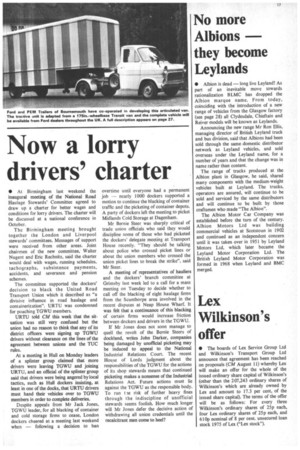Now a lorry drivers' charter
Page 19

If you've noticed an error in this article please click here to report it so we can fix it.
• At Birmingham last weekend the inaugural meeting of the National Road Haulage Stewards' Committee agreed to draw up a charter for better wages and conditions for lorry drivers. The charter will be discussed at a national conference in October.
The Birmingham meeting brought together the London and Liverpool stewards' committees. Messages of support were received from other areas. Joint chairmen of the new committee, Walter Nugent and Eric Rechnitz, said the charter would deal with wages, running schedules, tachographs, subsistence payments, accidents, and severance and pension schemes.
The committee supported the dockers' decision to black the United Road Transport Union which it described as "a divisive influence in road haulage and containerization". URTU was condemned for poaching TGWU members.
URTU told CM this week that the situation was still very confused but the union had no reason to think that any of its district officers were signing up TGWU drivers without clearance on the lines of the agreement between unions and the TUC rules.
At a meeting in Hull on Monday leaders of a splinter group claimed that more drivers were leaving TGWU and joining URTU, and an official of the splinter group said that drivers were being angered by local tactics, such as Hull dockers insisting, at least in one of the docks, that URTU drivers Must hand their vehicles over to TGWU members in order to complete deliveries.
Despite appeals from Mr Jack Jones, TGWU leader, for all blacking of container and cold storage firms to cease, London dockers cheered at a meeting last weekend when — following a decision to ban overtime until everyone had a permanent job — nearly 1000 dockers supported a
motion to continue the blacking of container traffic and the picketing of container depots. A party of dockers left the meeting to picket Midlands Cold Storage at Dagenham.
Mr Bernie Steer was sharply critical of trade union officials who said they would discipline some of those who had picketed the dockers' delegate meeting at Transport House recently. "They should be talking about police who crossed picket lines or about the union members who crossed the union picket lines to break the strike", said Mr Steer.
A meeting of representatives of hauliers and the dockers' branch committee at Grimsby last week led to a call for a mass meeting on Tuesday to decide whether to call off the blacking of eight haulage firms from the Scunthorpe area involved in the recent disputes at Neap House Wharf. It was felt that a continuance of this blacking of certain firms would increase friction between dockers and drivers in the TGWU.
If Mr Jones does not soon manage to quell the revolt of the Bernie Steers of dockland, writes John Darker, companies being damaged by unofficial picketing may be induced to appeal to the National Industrial Relations Court. The recent House of Lords judgment about the responsibilities of the TGWU for the actions of its shop stewards means that continued picketing makes a nonsense of the Industrial Relations Act. Future actions must lie against the TGWU as the responsible body.
To run tie risk of further heavy fines through the indiscipline of unofficial stewards seems foolish. How much longer will Mr Jones defer the decisive action of withdrawing all union credentials until the recalcitrant men come to heel?


































































































